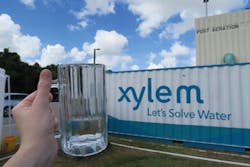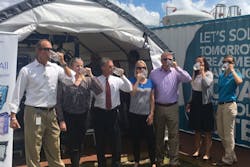In 2016 Hillsborough County Public Utilities, a forward thinking organization, initiated the first direct potable reuse pilot project in Florida. In its efforts to utilize 100 percent of its reclaimed water, the progressive utility created a successful program to effectively suspend surface water discharges.
Scope
Hillsborough County has the largest retail reclaimed water program in the Nation, with more than 17,000 customers and agreements in place to serve another 5,000, for a total of 22,000 accounts. In 2009, the county produced about 34 million gallons per day on average, with over 22 million gallons being distributed to customers, while the rest was discharged into surface waters. The average annual use of reclaimed water was around 60 percent, a byproduct of Florida’s weather patterns. There were weeks every year when the utility was utilizing 100 percent of its reclaimed water and much less during the dry months and rainy season. The utility’s long-term goal was to achieve 100 percent beneficial use of its reclaimed water 365 days a year.
In the early 1980’s the utility converted its operations to tertiary treatment. By 2009, the county’s Falkenburg Advanced Wastewater Treatment Plant, just east of the city of Tampa, underwent a major $31-million expansion,
consisting of conversion of the existing chlorine contact chamber to a state-of-the-art ultraviolet disinfection (UV); a new headworks structure; the replacement of eight existing aerators with new higher capacity units, including variable frequency drives; the construction of a 100-foot clarifier; and the construction of two new nine-million gallon reject water storage tanks, including a reject pump station. Three emergency generators were also added, with upgrades to the existing reclaimed water and plant service water pump station. Finally, installation of modern SCADA with security camera, associated site work, and electrical controls were completed.
Solution
In July 2016, GE’s UF and reverse osmosis units and Xylem’s Wedeco MiPro™ portable trailer-based pilot plant was used for UV/peroxide advanced oxidation process (AOP) to produce potable reclaimed water at the Falkenburg WRF (Water Reclamation Facility). Tetra Tech–a provider of consulting, engineering, and technical services–collaborated with the WateReuse Association, Xylem, and GE to design, build, and operate the direct potable reuse pilot purification process to treat reclaimed effluent wastewater to comply with EPA drinking water standards.
At the WRF, Tetra Tech’s design for the pilot system put water through an additional, stringent purification process, following full advanced treatment. Biological nutrient removal and UV disinfection are followed by tertiary treatment with ultrafiltration, reverse osmosis, and Xylem’s Wedco MiPro™ AOP with UV and peroxide. The treated water was tested for primary and secondary drinking water standards, as well as non-regulated microconstituents, pharmaceuticals, and personal care products.
Water quality monitoring revealed the water from the pilot purification process met all drinking water standards for maximum contaminant levels (MCLs) set by the federal EPA adopted by the Florida Department of Environmental Protection.
Results
The pilot project validated direct potable reuse, which is now a key initiative for many central Florida utilities due to the implementation of the Central Florida Water Initiative requiring the additional utilization of reuse water resources. Historically, any excess water not used by reuse customers was discharged to surface water.
The WRF is staffed around the clock, seven days per week by personnel certified in wastewater treatment. Operational staff is responsible for collecting and analyzing random samples throughout the system to ensure compliance with permit conditions, as well as preparing and submitting all required reports to the regulatory agencies.
In 2016, the WaterReuse Association had an idea – start the conversation about potable reuse with beer! Working with Special operations, a beer brewing organization located in Tampa, they planned to provide potable reclaimed water for the purpose of craft beer brewing in the New Water Brew Competition. Potable reclaimed water produced by the pilot at the Faulkenburg WRF -- treated to the highest standards – was provided to around 100 registered home brewers, each of which received around ten gallons of purified water for brewing.
The beers were sampled at the 2016 Annual WaterReuse Symposium in Tampa where judges awarded cash prizes and medals for first, second, and third places in four sub-categories of beer. The beer samples were also showcased at the October 2016 WEFTEC conference in New Orleans and will be taken on the road in 2017 with panel discussions, workshops, and beer tastings at water events throughout the US.
All in all, the beers brewed with potable reclaimed water received high praise and kudos from the judges, participants, and consumers, who were all glad that this water was recycled for the highest purpose - brewing beer!
Editor's Note: Scranton Gillette Communications and the SGC Water Group are not liable for the accuracy, efficacy and validity of the claims made in this piece. The views expressed in this content do not reflect the position of the editorial teams of Water & Wastes Digest, Water Quality Products and Storm Water Solutions.

